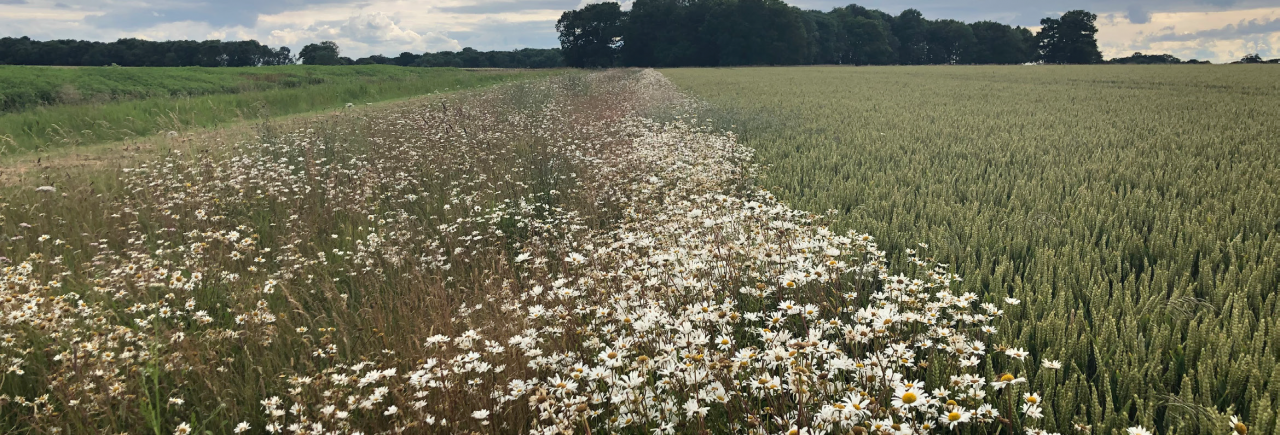Countryside Stewardship can help with difficult-to-farm areas
In our industry, we might be forgiven for thinking 'we've seen it all' at times, but nothing could have prepared anyone for the Covid-19 pandemic and the impact it is having on our lives, both at home and at work.
Reducing the risk to our customers and team is our number one priority, so we've been adopting new ways of working to make sure we're still able to support growers and provide valuable technical advice from afar. Who would have thought that a combination of phone calls, video conferences, and social media platforms could help us to safely deliver our services to farm businesses of all shapes and sizes?
We've seen a lot of changes in the last few weeks, most notably down to the weather. As I look out at the bright sun and blue sky, it's hard to believe the horrendous rainfall we were up against not too long ago. Now though, we've embarked on what is proving to be a consistently dry spell and, judging by some of the recent phone and video conversations we've been having, many growers have been able to get on and complete spring drilling in reasonable good time.
However, one thing that we have been hearing is that quite a number of headlands have suffered as a result of the poor weather earlier in the year, and would benefit from establishing spring/summer covers to help with soil structure and vitality. It's not too late to incorporate some of these mixes – establishment in May and early June will still see a 10 to 12 week growing season which allows the mixes to take advantage of maximum daylight hours, and hopefully ideal growing conditions.
Planting a mixture that includes radish, oats, phacelia and vetch for example, or a combination of buckwheat, crimson, berseem and red clovers, and Serredella vetch, will improve soil structure, help organic matter, reduce erosion and run-off risk, and provide pollen and nectar sources for a range of pollinating insects; a real win-win.
As well as causing frustration, loss of time and income, and resulting in changes to rotation, the autumn/winter weather will have focussed many minds on those difficult-to-farm areas. This has resulted in a significant interest in Countryside Stewardship applications. There are some great opportunities in the scheme to help provide a good, regular income over five years. The fact that Defra have confirmed that those entering Countryside Stewardship will not be disadvantaged by the expected launch of the Environmental Land Management (ELM) scheme is great news too.
The deadline for submitting an application for Countryside Stewardship is 31st July, so there is still time to apply for a 2021 start. More information on the benefits of Countryside Stewardship and the application process can be found in this blog, written earlier in the year by fellow Kings technical advisor, Hannah Clarke. The application process is relatively straightforward and the Kings team is on hand to help. It's an income stream we don't think many can afford to overlook and, with options such as legume and herb rich swards – which help in the fight against grass weeds and can improve soil health – it's worth considering. Don't forget; the new ELMs is unlikely to be launched before 2025 and is planned to replace the current Basic Payment Scheme (BPS) support system and Countryside Stewardship scheme. The current policy document says ELMs will be open for applications in late 2024.BFBC proves stewardship efforts make a big difference
This month, in amongst everything else, we've seen some really positive news from the Game and Wildlife Conservation Trust as it published the results of the seventh Big Farmland Bird Count.
Over 1,500 farmers, land managers and gamekeepers took part – the best turn out so far! An impressive 25 red-listed species were recorded, with nine featuring in the 25 most commonly seen species. Of these, fieldfares, starlings, linnets and lapwings were the four most abundant red-listed species recorded, with over 67,000 spotted in total which equates to 24% of all species spotted.
Kings is really proud to be one of the sponsors of this great initiative and from all of us in the team, we'd like to convey a huge thank you to everyone who took part. It's a great initiative that highlights the fantastic work so many farmers and landowners undertake to support farm wildlife conservation. The count will be back for its eighth run in February next year and I'll certainly be pestering everyone to take part.
More information about the wider benefits of Countryside Stewardship, including how it can support the whole farm business through crop rotations, soil health and grass weed control, will be covered in a follow-up blog from Kings. For help with any of the above or if you have more questions about the scheme, please get in touch.
As a subscriber, you’ll receive email alerts each time a new blog is published so you can always stay updated with the latest advice and insights from our experts







Comments